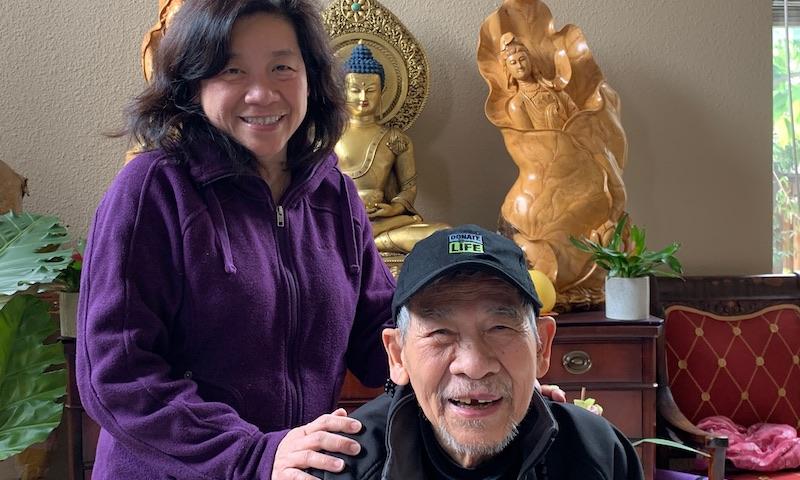by Christine Nguyen, MD. This story originally aired on KALW Public Radio.

Quyen and Bob Vuong rely on their Buddhist faith to frame their understanding of aging. (Photo: Christine Nguyen, KALW)
It was August 24, 2017, one day before Hurricane Harvey, a category 4 hurricane, hit Houston and dumped more water than any storm ever recorded in United States history. In just a few days, Houston saw as much rain as it usually saw in a year. My brother picked up our dad, who was 82, at his house, where he lived alone, and they evacuated to higher ground. They rode out the storm in the countryside. My brother’s in-laws had gotten 10 pounds of ground beef and made enough chili to last through the storm. This is Texas after all.
My brother said Dad seemed disoriented when he evacuated. “You know, dad didn’t eat,” he told me later. “He just read the news on his iPad.” In the bathroom, Dad crapped on the floor. At night he paced, yelling to himself. My brother listened through the wall, just like when we were kids. I felt bad my sister-in-law had to witness Dad’s erratic behavior. Embarrassed.
A week after he fled Houston, Dad insisted on being dropped off back at his house. He would be fine, he insisted. He had a case of Ensure Plus. My brother let me know the situation as he drove back to his in-laws’ home. This news rang some alarm bells, but I crossed my fingers. My father had survived worse. But a few days later, when my brother came to check on him, Dad didn’t answer. TV news blared through the door. Inside, the house didn’t look much different from the bathroom a few days ago. Dad was on the couch on top of some towels. My brother brought him to the emergency room, and he got admitted to the intensive care unit. He was 86 pounds.
I’d had a sinking feeling about Dad for a long time. But even though I’m a doctor, I hadn’t been able to face up to it — Dad had dementia. My brother called for advice and reassurance. What was going on? I finally connected the dots. I texted my brother information from the Alzheimer’s Association about signs of dementia. Later, I learned more. Like, when someone has dementia, a change from routine can make them worse. Experts call it transfer trauma. Dad had been an army man for the South Vietnamese during the Vietnam War. For more than 40 years, he had continually relived the decisions he’d made toward the end of the war. Decisions that seemed to fix my family’s fate for years to come. Maybe the evacuation from Hurricane Harvey reminded him of that last day of April 1975, when he refused to leave Vietnam on American rescue airlifts.
My family had thought that evacuating Dad from Hurricane Harvey would make him safer. And from a purely physical perspective, he was. But the transfer trauma from the move increased his overall chance of dying by three times. To this day, my family doesn’t really discuss Dad’s dementia. Although dementia is the top diagnosis in older adults, most families and doctors don’t recognize it. Furthermore, Asians like my family have a higher incidence of vascular dementia than the general population.The research specifically into Southeast Asians is sparse. They have many risk factors for dementia, and this makes them more vulnerable than the general population.
***
To listen to or read the rest of this story, visit the KALW website.
The opinions expressed in this article are those of the author and do not necessarily reflect those of the Diverse Elders Coalition.
